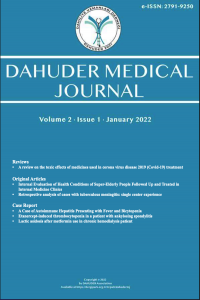Öz
Kaynakça
- Çilingiroğlu N, Demirel S. 2004. Yaşlılık ve yaşlı ayrımcılığı. Turkish Journal of Geriatrics, 7(4):225-30.
- Bilir N, Paksoy Erbaydar N. Yaşlılık Sorunları. Halk Sağlığı Temel Bilgiler (Güler Ç, Akın L. Ed), 3st ed, Ankara: Hacettepe Üniversitesi Yayınları; 2015:1528-1538.
- Harrison TM, Weintraub S, Mesulam MM, Rogalski E. Superior memory and higher cortical volumes in unusually successful cognitive aging. J Int Neuropsychol Soc. 2012 Nov;18(6):1081-5. doi:10.1017/S1355617712000847.
- World Population Ageing .2013. New York: United Nations. Available from: https://www.un.org/en/development/desa/population/publications/pdf/ageing/WorldPopulationAgeing2013.pdf
- The World bank data Available at: http://data.worldbank.org/indicator/SP.DYN.CDRT.IN/countries/TR?display=graph Accessed September 14, 2019.
- Berrougui H., Isabelle M., Cloutier M., Grenier G., Khalil A. 2007. Age-related impairment of HDL-mediated cholesterol efflux. J. Lipid Res. 2007 Feb;48(2):328-36. doi: 10.1194/jlr.M600167-JLR200.
- Rothblat G.H., Phillips M.C. 2010. High-density lipoprotein heterogeneity and function in reverse cholesterol transport. Curr. Opin. Lipidol. 2010 Jun;21(3):229-38. doi: 10.1097/mol.0b013e328338472d.
- Khera A.V., Cuchel M., de la Llera-Moya M. ve ark. 2011.Cholesterol efflux capacity, high- density lipoprotein function, and atherosclerosis. N. Engl. J. Med. 2011 Jan 13;364(2):127-35. doi: 10.1056/NEJMoa1001689.
- Onat A., Yüksel M., Köroğlu B. ve ark. [Turkish Adult Risk Factor Study survey 2012: Overall and coronary mortality and trends in the prevalence of metabolic syndrome]. Turk Kardiyol Dern Ars. 2013 Jul;41(5):373-8. doi: 10.5543/tkda.2013.15853.
- Girgis CM. Vitamin D and muscle function in the elderly: the elixir of youth? . Curr Opin Clin Nutr Metab Care. 2014 Nov;17(6):546-50. doi: 10.1097/MCO.0000000000000104.
- Bischoff-Ferrari HA, Dietrich T, Orav EJ, Dawson-Hughes B. Positive association between 25- hydroxy vitamin D levels and bone mineral density: a population-based study of younger and older adults. Am J Med. 2004 May 1;116(9):634-9. doi: 10.1016/j.amjmed.2003.12.029.
- Yildiz HI, Yalcin A, Aras S et al. The Relationship Between Serum Vitamin D Levels and Bone Mineral Density Among Geriatric Population: A Cross Sectional Study. Bozok Med J. 2016;6(3):1-7.
- Atli T, Gullu S, Uysal AR, Erdogan G. The prevalence of Vitamin D deficiency and effects of ultraviolet light on Vitamin D levels in elderly Turkish population. Arch Gerontol Geriatr. Jan-Feb 2005;40(1):53-60. doi: 10.1016/j.archger.2004.05.006.
Internal Evaluation of Health Conditions of Super-Elderly People Followed Up and Treated in Internal Medicine Clinics
Öz
Introduction: A rise in the geriatric population has resulted from the extension of life expectancy in tandem with development. In this population, the super-elderly plays a significant role. In this study, it was aimed to internally evaluate the health status of super-elderly people who were followed up and treated at the Department of Internal Medicine of Recep Tayyip Erdoğan University.
Methods: The study included 393 patients, 246 women and 147 men, all of whom were over the age of 80. The patient files were scanned retrospectively. The patients' demographics, gender, chronic internal diseases, blood count, biochemical parameters, thyroid function tests, B12, and vitamin D levels were all documented. An appropriate statistical programme was used to analyse the collected data.
Results: In terms of chronic disease and drug use, there was no significant difference between the genders in the evaluation of the patients. There were no differences in blood hemogram values between men and women. Women had higher total cholesterol, low-density lipoprotein cholesterol and high-density lipoprotein cholesterol levels than men. Vitamin D levels were found to be 13,3±9,83 ng/dl in males, 20,3±24,1 g/dl in females and an average of 15,5±16,0 ng/dl in all patients. Vitamin D levels were found to be low in both men and women.
Conclusion: The majority of patients over the age of 80 have vitamin D deficiency, according to these findings. Vitamin D deficiency, which has been linked to increased fragility, should be monitored in this patient group and supplemented if necessary.
Anahtar Kelimeler
Kaynakça
- Çilingiroğlu N, Demirel S. 2004. Yaşlılık ve yaşlı ayrımcılığı. Turkish Journal of Geriatrics, 7(4):225-30.
- Bilir N, Paksoy Erbaydar N. Yaşlılık Sorunları. Halk Sağlığı Temel Bilgiler (Güler Ç, Akın L. Ed), 3st ed, Ankara: Hacettepe Üniversitesi Yayınları; 2015:1528-1538.
- Harrison TM, Weintraub S, Mesulam MM, Rogalski E. Superior memory and higher cortical volumes in unusually successful cognitive aging. J Int Neuropsychol Soc. 2012 Nov;18(6):1081-5. doi:10.1017/S1355617712000847.
- World Population Ageing .2013. New York: United Nations. Available from: https://www.un.org/en/development/desa/population/publications/pdf/ageing/WorldPopulationAgeing2013.pdf
- The World bank data Available at: http://data.worldbank.org/indicator/SP.DYN.CDRT.IN/countries/TR?display=graph Accessed September 14, 2019.
- Berrougui H., Isabelle M., Cloutier M., Grenier G., Khalil A. 2007. Age-related impairment of HDL-mediated cholesterol efflux. J. Lipid Res. 2007 Feb;48(2):328-36. doi: 10.1194/jlr.M600167-JLR200.
- Rothblat G.H., Phillips M.C. 2010. High-density lipoprotein heterogeneity and function in reverse cholesterol transport. Curr. Opin. Lipidol. 2010 Jun;21(3):229-38. doi: 10.1097/mol.0b013e328338472d.
- Khera A.V., Cuchel M., de la Llera-Moya M. ve ark. 2011.Cholesterol efflux capacity, high- density lipoprotein function, and atherosclerosis. N. Engl. J. Med. 2011 Jan 13;364(2):127-35. doi: 10.1056/NEJMoa1001689.
- Onat A., Yüksel M., Köroğlu B. ve ark. [Turkish Adult Risk Factor Study survey 2012: Overall and coronary mortality and trends in the prevalence of metabolic syndrome]. Turk Kardiyol Dern Ars. 2013 Jul;41(5):373-8. doi: 10.5543/tkda.2013.15853.
- Girgis CM. Vitamin D and muscle function in the elderly: the elixir of youth? . Curr Opin Clin Nutr Metab Care. 2014 Nov;17(6):546-50. doi: 10.1097/MCO.0000000000000104.
- Bischoff-Ferrari HA, Dietrich T, Orav EJ, Dawson-Hughes B. Positive association between 25- hydroxy vitamin D levels and bone mineral density: a population-based study of younger and older adults. Am J Med. 2004 May 1;116(9):634-9. doi: 10.1016/j.amjmed.2003.12.029.
- Yildiz HI, Yalcin A, Aras S et al. The Relationship Between Serum Vitamin D Levels and Bone Mineral Density Among Geriatric Population: A Cross Sectional Study. Bozok Med J. 2016;6(3):1-7.
- Atli T, Gullu S, Uysal AR, Erdogan G. The prevalence of Vitamin D deficiency and effects of ultraviolet light on Vitamin D levels in elderly Turkish population. Arch Gerontol Geriatr. Jan-Feb 2005;40(1):53-60. doi: 10.1016/j.archger.2004.05.006.
Ayrıntılar
| Birincil Dil | İngilizce |
|---|---|
| Konular | İç Hastalıkları |
| Bölüm | Research Articles |
| Yazarlar | |
| Yayımlanma Tarihi | 29 Ocak 2022 |
| Gönderilme Tarihi | 5 Ekim 2021 |
| Yayımlandığı Sayı | Yıl 2022 Cilt: 2 Sayı: 1 |



